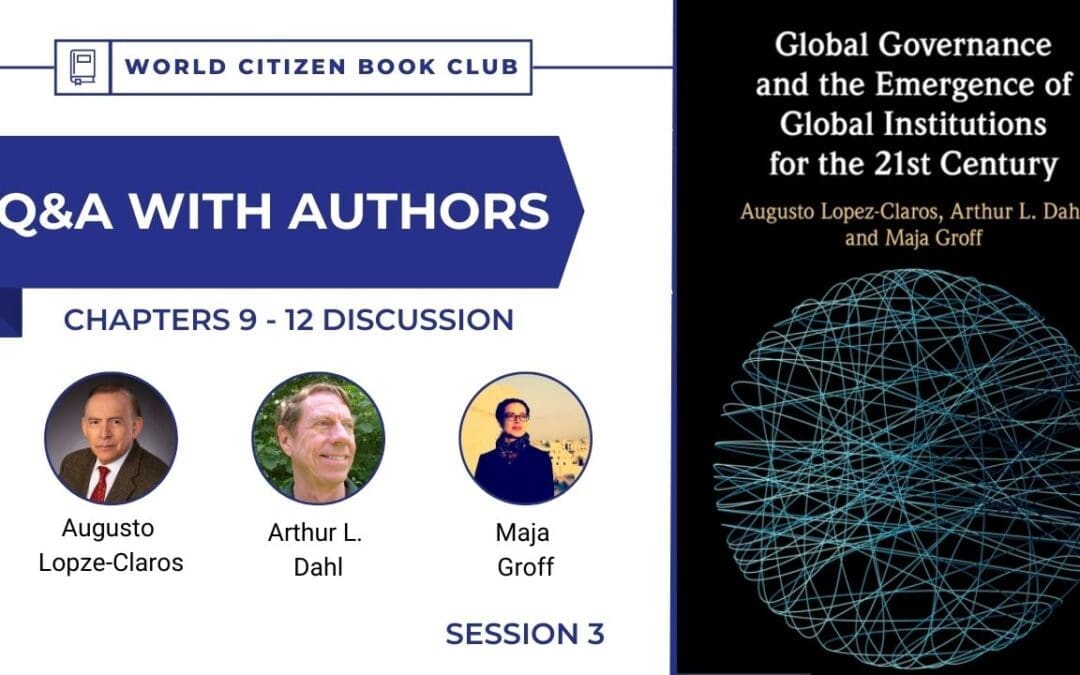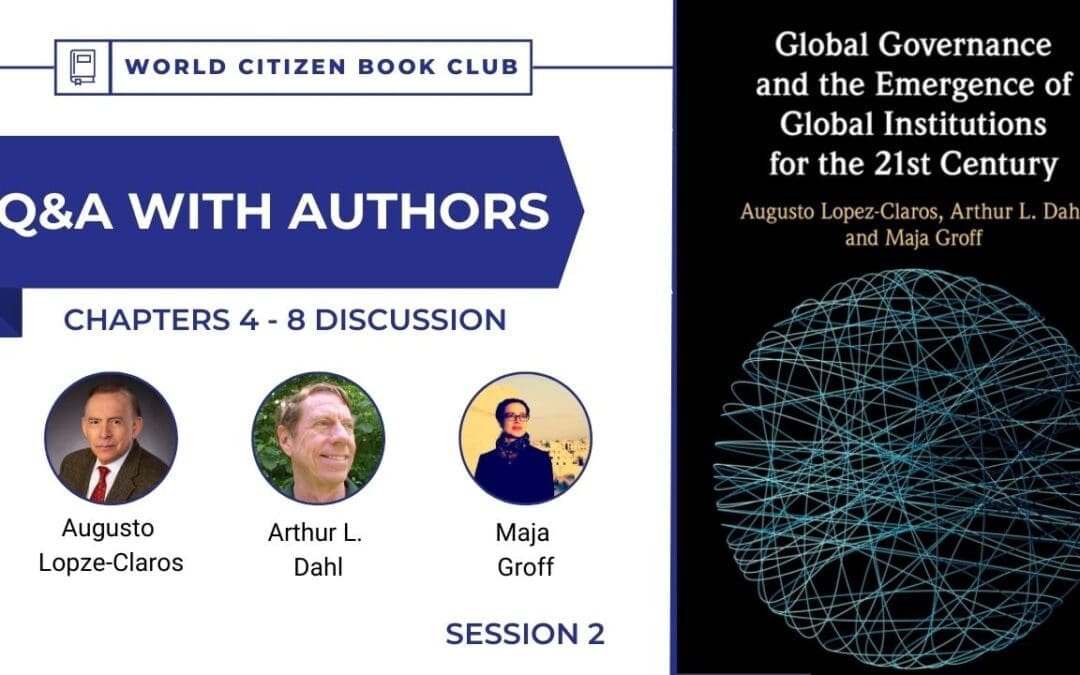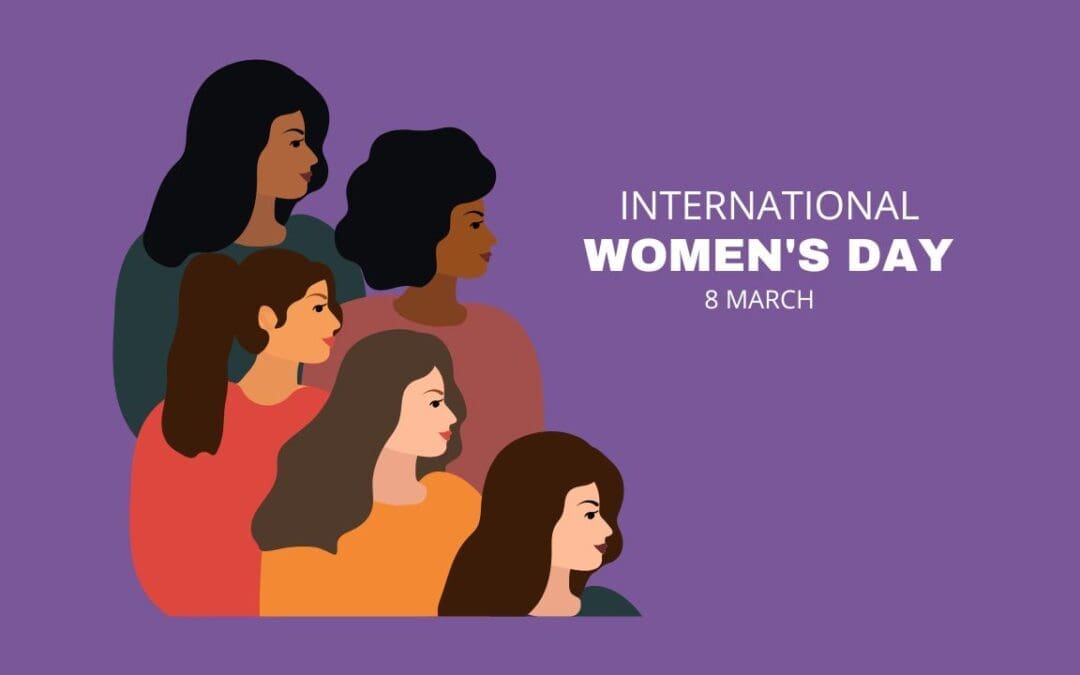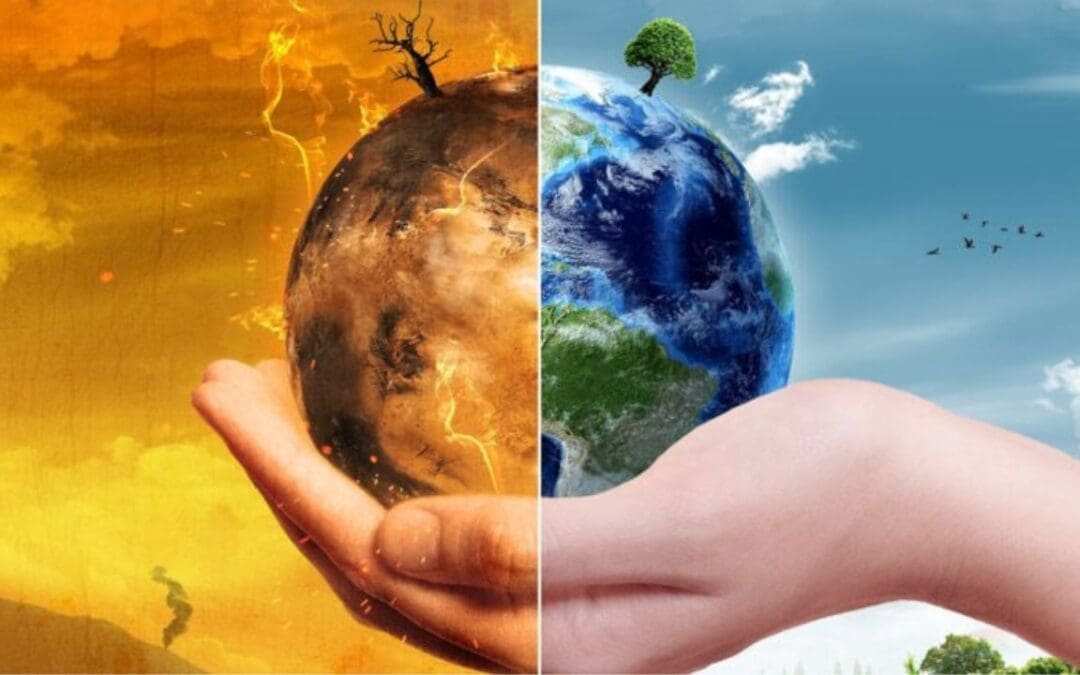
by Citizens for Global Solutions | Apr 8, 2023 | Past Event
Session 3 of the book, Global Governance and the Emergence of Global Institutions for the 21st Century, with all three authors, Augusto Lopez-Claros, Arthur Dahl, and Maja Groff. Our focus will be on the second half of Part 2 discussing reforming the central institutions of the UN. Those chapters present ideas regarding disarmament, international law, human rights, and UN funding.

by Citizens for Global Solutions | Mar 11, 2023 | Past Event
Our second session with all three authors, Augusto Lopez-Claros, Arthur Dahl, and Maja Groff, focuses on Part 2: Reforming the Central Institutions of the UN (Chapters 4-8, pages 81-180). They discuss the authors’ proposals to reform the General Assembly and to establish a World Parliamentary Assembly, Advisory Mechanisms, a UN Executive Council, and an International Peace Force.

by Citizens for Global Solutions | Mar 6, 2023 | Organizational Statement
Empowering Women, Transforming Lives: The Power of Technology on International Women’s Day
Washington, DC- On March 8, Citizens for Global Solutions (CGS) joins the United Nations and civil society throughout the world in celebrating International Women’s Day, which is dedicated to celebrating the social, economic, cultural, and political achievements of women around the world. This year’s focus is on “women’s full and effective participation and decision-making in public life, as well as the elimination of violence, for achieving gender equality and the empowerment of all women and girls.”
The theme for International Women’s Day on March 8, 2023 has been announced as “DigitALL: Innovation and technology for gender equality.” This year’s theme is aligned with the focus of the upcoming 67th Session of the Commission on the Status of Women (CSW-67): “DigitALL: Innovation and technology for gender equality.” The theme highlights the importance of leveraging technology and innovation to promote gender equality and empower women and girls.
The benefits of including women and other marginalized groups in technology are numerous. Not only does promoting social equity vis-à-vis technology result in more creative solutions, but it also can drive innovation that meets women’s needs and promotes gender equality. Conversely, the exclusion of women from technology comes with significant costs. According to the UN Women’s Gender Snapshot 2022 report, women’s exclusion from the digital world has caused a loss of $1 trillion from the GDP of low and middle-income countries in the last decade, and this loss is projected to increase to $1.5 trillion by 2025 without action. Reversing this trend will require tackling the problem of online violence, which a recent study revealed 38% of women in 51 countries have personally experienced.
We at Citizens for Global Solutions and Young World Federalists firmly believe that reversing these trends can be best achieved through strengthening international laws to protect women and girls against online violence. Specific steps that can be taken include urging the UN General Assembly to continually push for universal compliance with the Universal Declaration of Human Rights– of which gender equality is a significant part. Furthermore, the UN General Assembly could convene to revise the Convention on the Elimination of All Forms of Discrimination against Women (CEDAW)- informally known as the “International Bill of Rights” for women- by adding a provision addressing gender exclusion and discrimination in the technological sphere. Finally, UN member states could collectively agree to empower the Commission on the Status of Women by strengthening its relationship with the more representative UN General Assembly- not just ECOSOC, whose members don’t fully reflect UN member states. The Commission could also convene on a more regular basis and address the lack of substantial provisions regarding technology in the Beijing Platform for Action, a global blueprint for gender equality.
In commemoration of International Women’s Day, we look forward to continue working with civil society worldwide to strengthen grassroots and international efforts to safeguard gender equality both within and outside of the UN system.
About Citizens for Global Solutions & Young World Federalists
Citizens for Global Solutions (CGS) is a non-governmental, non-profit, non-partisan membership-based organization that for more than 75 years has brought together a diverse collective of individuals and organizations with a common goal of a unified world predicated upon peace, human rights, and the rule of law. From championing ratification of the UN Charter upon our establishment in 1947 to supporting creation of the International Criminal Court (ICC) 25 years ago to advocating for global instruments to confront today’s enduring challenges of war and climate degradation, CGS recognizes that true progress is a generational enterprise. We invite like-minded individuals and organizations to join us in this mission.
The Young World Federalists are a global movement fighting to give humanity a voice. We envision a sustainable, just, and peaceful world through a democratic world federation. A world run by humanity, for humanity, providing equal opportunity to all on a thriving planet.
Contact: Donna Park dpark@globalsolutions.org

by Citizens for Global Solutions | Feb 22, 2023 | Climate Justice
When it comes to the climate crisis, we are running out of time.
In 1994, the UN Framework Convention on Climate Change established the Conference of the Parties (COP) to encourage UN member states to meet annually to discuss scientific data and technological advances related to climate change and implement international environmental agreements. Despite the global interest in addressing climate change, the next 29 years would be characterized by lukewarm international efforts to divert a climate catastrophe. In line with this record, the recent COP27 hosted by Egypt failed to secure cooperation on key issues and induce the necessary commitments to reduce greenhouse gas emissions.
One of the earliest international environmental treaties was the Montreal Protocol of 1987. The Montreal Protocol was a success because all 197 UN member states ratified the treaty and it effectively coordinated international efforts to eradicate about 99 percent of ozone-depleting substances (ODS). One major reason behind its success was that it established a “Multilateral Fund” to provide financial backing to countries, especially those who were not meeting their goals. It also prioritized the concept of “common but differentiated responsibilities” by giving developing countries more time to eliminate their production of ODS.
The Kyoto Protocol, which entered into force in 2005, was the first “legally binding” climate treaty that aimed to reduce greenhouse gas emissions. However, it was not successful because the United States never ratified it and China was not required to commit to stringent emissions reduction targets. As this treaty required real economic sacrifices from industrialized countries, it was unable to effectively coordinate international efforts.
The most comprehensive environmental treaty to date was the Paris Agreement of 2015. The Paris Accords required all UN member states to commit to containing average global temperature increases to below 1.5°C above pre-industrial temperatures through setting nationally determined contributions (NDCs). However, this unenforceable agreement was vulnerable to the vicissitudes of domestic politics that led countries to renege on their climate commitments or abandon the treaty altogether, as the United States did under President Donald Trump. Consequently, most climate change experts say that countries’ emissions reduction plans are not sufficient and will not be executed quickly enough to contain temperature increases to 1.5°C.
What lies behind the failure of international climate treaties to secure meaningful action?
One factor is the disagreement between industrialized and developing nations over which should bear most of the burden for reducing greenhouse gas emissions. Wealthy countries like the United States and Britain have contributed the most to cumulative emissions by normalizing environmentally unsustainable overconsumption. Beginning with the Industrial Revolutions, emissions stemming from the manufacturing of goods in European countries, supplied with raw materials from their colonies in Africa, South America, and Asia, skyrocketed. Industrializing countries like China and formerly colonized nations like India argue that, given the economic wealth and technological advancements acquired by others through industrialization and colonization, the wealthiest countries are the best equipped financially and technologically to lead efforts to address the climate crisis. They insist that demands to cut back on their own emissions are unreasonable, given their minor role in causing the current crisis, and that reducing their emissions will temporarily stifle the economic growth that wealthier countries have enjoyed.
Furthermore, the lack of global institutions that enact, interpret, and enforce international environmental laws and treaties seriously hinders coordinated international action. This “global governance deficit” lies at the root of international environmental treaties’ inability to catalyze collective action and hold countries to their climate commitments. A world order based on absolute national sovereignty therefore sacrifices a sustainable world future at the altar of national sovereignty and national political considerations.
To address these challenges, the world urgently needs international legal action that goes beyond the nation-state status quo. The UN General Assembly could be reformed to pass legally binding and enforceable resolutions through a voting process that also takes into account factors like population. The General Assembly could then pass binding resolutions requiring industrialized and high emitting countries like the United States and China to spearhead emissions reduction efforts and establish ecocide law to make environmental destruction an international criminal act, prosecuted by the International Criminal Court. Building an enforcement mechanism into international environmental treaties would mitigate our current climate crisis.
Promoting meaningful international climate action may also require creating new global governance institutions, such as an International Court for the Environment. Experts have proposed a “Climate Club” that would establish a single international target carbon price and sanction noncompliant countries and countries that do not participate.
In today’s warming world, the stakes have never been higher. To prevent an irreversible chain reaction of climate catastrophe, we must marshal our scientific acumen, political will, and technological prowess on a global scale to contain global temperature rise. Doing so will require addressing the politics of climate change policy within and among countries and the current ineffective system of global environmental governance, including its unenforceable international treaties.
The path forward will not be easy, for it will require unprecedented grassroots mobilization and political courage. But the task isn’t impossible. The far-sighted individuals who gathered in San Francisco to create the United Nations knew the difficulties that awaited them, but never surrendered to pessimism, hopelessness, or cowardice. They appreciated that the survival of humankind largely depended on their determination to forge a new path forward for international governance. We must do the same now with respect to the climate crisis, embracing effective global environmental governance and cooperation. The survival of 8 billion humans and all other species on our beloved Earth hinges on our success.






































